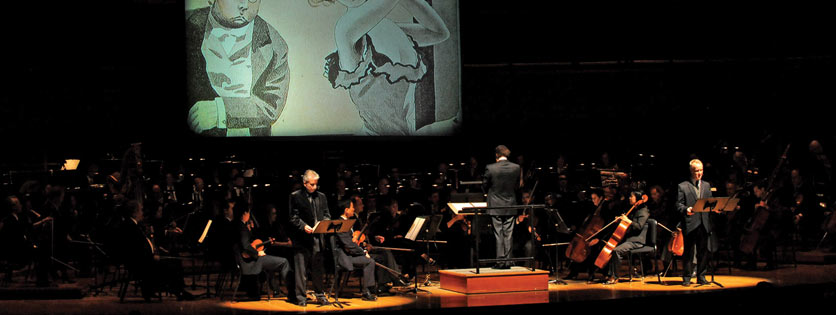
Now in its third year of success in Philadelphia, these events bring insights for newcomers and seasoned concertgoers alike. The first half of each Beyond the Score program offers a multimedia examination of the selected score—its context in history, the details of a composer's life that influenced its creation, sharing the illuminating stories found "inside" the music. Written and created by the Chicago Symphony Orchestra's creative director, Gerard McBurney, live musical examples are called upon to illustrate the structure of each composition. After an intermission, return to the hall to hear a performance of the work played in its entirety.
beyond the score thursday 7:00 PM
Elgar: "Enigma" Variations
October 27, 2011
Charles Dutoit Conductor
Gerard McBurney Host
To 19th-century Germans, England was famously "the land without music." There had been no British composers of distinction for 200 years. So, when suddenly and unexpectedly an obscure provincial musician named Edward Elgar brought forth a strange orchestral piece—a set of variations on an unknown theme in which each movement was a portrait of one of his friends—it was a matter for astonishment, an enigma indeed. "Here," declared one critic, "is a man who knows what he wants to say and knows how to say it!" |
 |
|
Mozart: Piano Concerto No. 27—Elusive Simplicity?
March 15, 2012
Jeffrey Kahane Conductor and Piano
Gerard McBurney Host
Beneath the simplicity of Mozart's final piano concerto lies one of the most subtle and perfect architectural structures in music. Composed less than a year before Mozart's untimely death, this concerto evokes a variety of intensely personal and painful experiences. By turns mysterious, luminous, and tragic, this kaleidoscope of sound is magically held together by a blend of elegance and poignancy. |
 |
|
Tchaikovsky: Symphony No. 4—Pure Melodrama?
April 19, 2012
Jaap van Zweden Conductor
The most shattering personal crisis of Tchaikovsky's life—his ill-conceived marriage to a young student in 1877—coincided with one of the greatest periods of his composing career. Over a mere two years, he poured out a stream of masterpieces, culminating in his Fourth Symphony, a 19th-century Russian music drama to rival the great literary dramas of Pushkin and Tolstoy. The young Russian knew he had achieved something extraordinary, calling his symphony "better than anything I've done so far." |
 |
|
| Philadelphia Orchestra performances of Beyond the Score® are made possible by support from the Hirschberg-Goodfriend Fund in memory of Adolf Hirschberg as established by Juliet J. Goodfriend, and by the Wachovia Wells Fargo Foundation. Additional funding comes from the Annenberg Foundation, the Pennsylvania Council on the Arts, and the Pennsylvania Department of Community and Economic Development. Beyond the Score is produced by the Chicago Symphony Orchestra. Gerard McBurney, Creative Director, Beyond the Score. Martha Gilmer, Executive Producer, Beyond the Score. |

